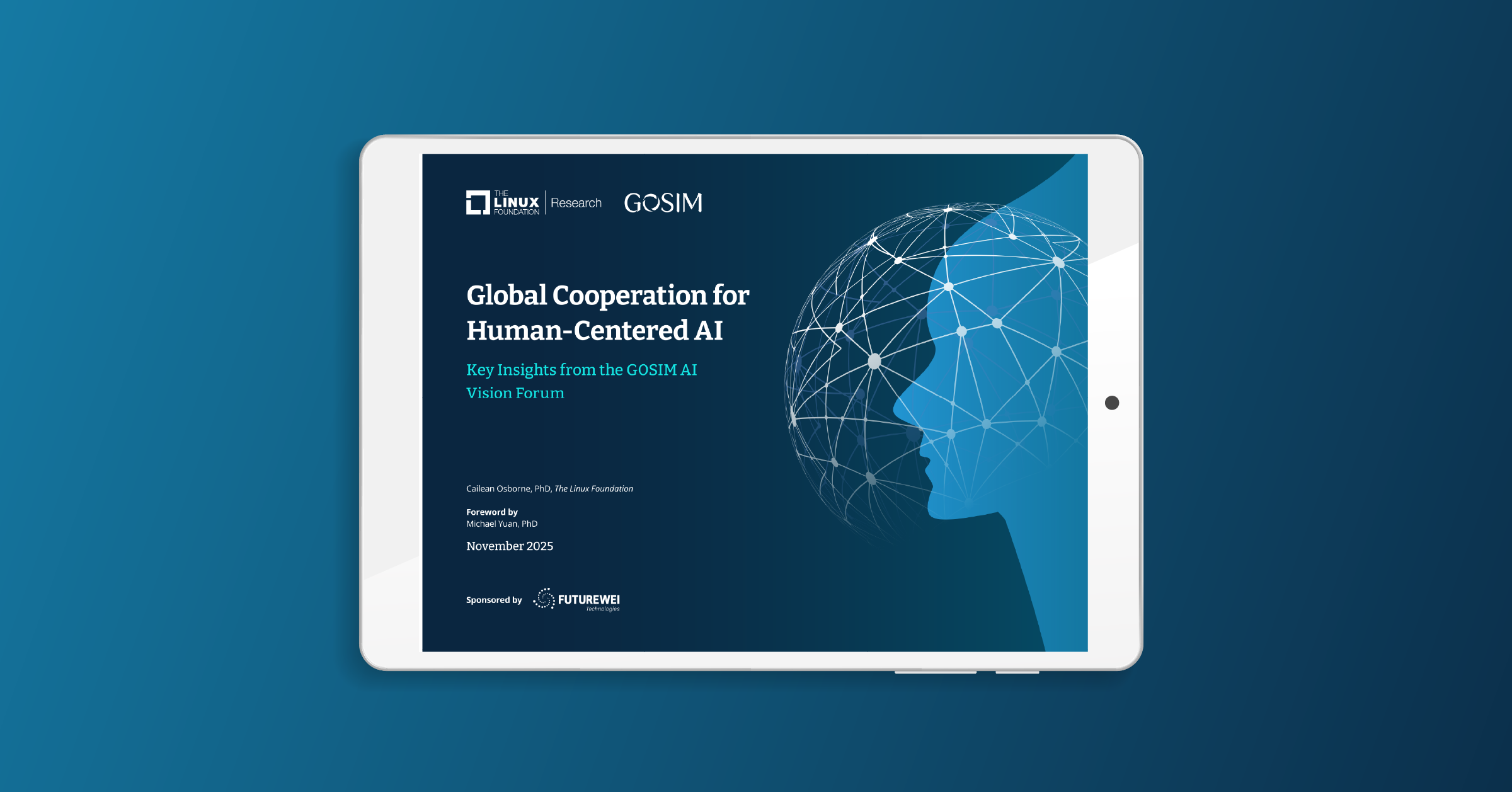Collective Wisdom: Why the Future of AI Must Be Built in the Open
Jesse McCrosky | 14 November 2025

The recent GOSIM AI Vision Forum in Hangzhou crystallized the central paradox of artificial intelligence: how to harness its immense potential while mitigating its considerable risks. AI is already augmenting our capacity for knowledge work by simplifying discovery, synthesis, and translation, as well as automating routine tasks. This automation frees individuals to engage in more meaningful and creative endeavors. Yet, these advancements are shadowed by urgent challenges, including equitable access, value-aligned governance, and protecting our social fabric from harm. As Dr. Michael Yuan highlights in the foreword of the recent Linux Foundation report Global Cooperation for Human-Centered AI, aligning AI with human values is crucial, but equally important is preparing humans to collaborate effectively with AI—a shift that requires us to evolve our fundamental understanding of work, education, and creativity.
Given AI's profound societal impact, a global and inclusive conversation about our collective future is essential. This means that all of us have the right to have a voice in the conversation about what sort of future we are building. This requires transparency to support an informed public and an open engagement model, allowing people from all walks of life and all parts of the world to share their thoughts. As a contribution to this conversation, here are some observations and recommendations for the path forward that came out of the event.
AI as a tool
To ensure AI serves humanity, it must be framed as a tool that augments human capabilities and is directed toward the correct ends. As an example, it is especially urgent that education is adapted to the AI era: while there are concerns that students might misuse AI to circumvent their studies, pedagogical innovations like the 'flipped classroom' and a greater emphasis on skills relevant to the AI era can reframe AI as a powerful educational tool rather than a crutch. The goal is to teach students to use AI to augment their thinking, not to outsource it.
This principle extends to the creative fields as well. The panel on art and AI discussed how AI can serve as a “new paintbrush” for artists, but that art will always stem from the human experience and the artist’s intention. As the report summarizes, while AI can be a new “paintbrush” for artists, “empathy and emotional depth... at the core of human creativity” will always emanate from the human experience and intention.
More broadly, AI is set to transform our fundamental concepts of work and skills. The report moves the conversation about the future of work beyond job displacement, focusing instead on the collaboration between humans and AI. It suggests that AI will augment human capabilities, taking over routine tasks and allowing people to focus on areas requiring creativity, critical thinking, and emotional intelligence. This shift necessitates a focus on lifelong learning and developing uniquely human skills to thrive in an AI-driven world.
AI for all
AI can be an equalizer, making information ever more accessible across language and cultural barriers, supporting education for the world’s children as a private tutor, and promoting interoperability and collaboration across borders. Or it can concentrate power among those with the resources to access and wield it. Simply put, if AI is to augment humanity, it must augment all of humanity.
Promoting AI as a digital public good, accessible to all, is a moral imperative and essential if AI is to reach its potential in empowering humanity. To give this mission a concrete direction, this approach should be explicitly aligned with the UN’s Sustainable Development Goals. As quoted in the report, Dr Mehdi Snene summarizes: “Open source AI can… translate knowledge into practical solutions. It reduces barriers, fosters interoperability, and promotes collaboration across borders. This ensures progress is not limited to the privileged few, but shared as a global resource benefiting all people equally.” Open source approaches are critical to achieving this vision.
Governance and defining success
Effective governance is essential for managing AI's risks, and open source can play a key role. Open source promotes the transparency necessary for broad auditing of AI systems, which in turn improves safety and reliability. This transparency is the foundation for a more accessible public dialogue, one focused not just on how AI works, but on how we measure its success. An effective governance structure must therefore champion this conversation, ensuring that the chosen metrics are debated openly and serve the public good. This is why global collaboration is essential—to ensure that the definitions of AI's success reflect the genuine needs and values of humanity.
Conclusion
AI has the potential to support our values and help us flourish, but approached incorrectly, it risks deepening inequality and eroding what makes us human. The path forward requires more than just technical solutions; it requires a commitment to open, global collaboration. As Emily Bennett of the UNICC suggests in the report, the highest aspiration is "to forge a new paradigm of neutrality; a transparent foundation upon which all may build, critique, and improve." An open approach is our best hope of ensuring that “the future of intelligence is shaped not by hidden biases, but by our collective wisdom.”
Jesse McCrosky is a Principal AI Architect at Egen AI.